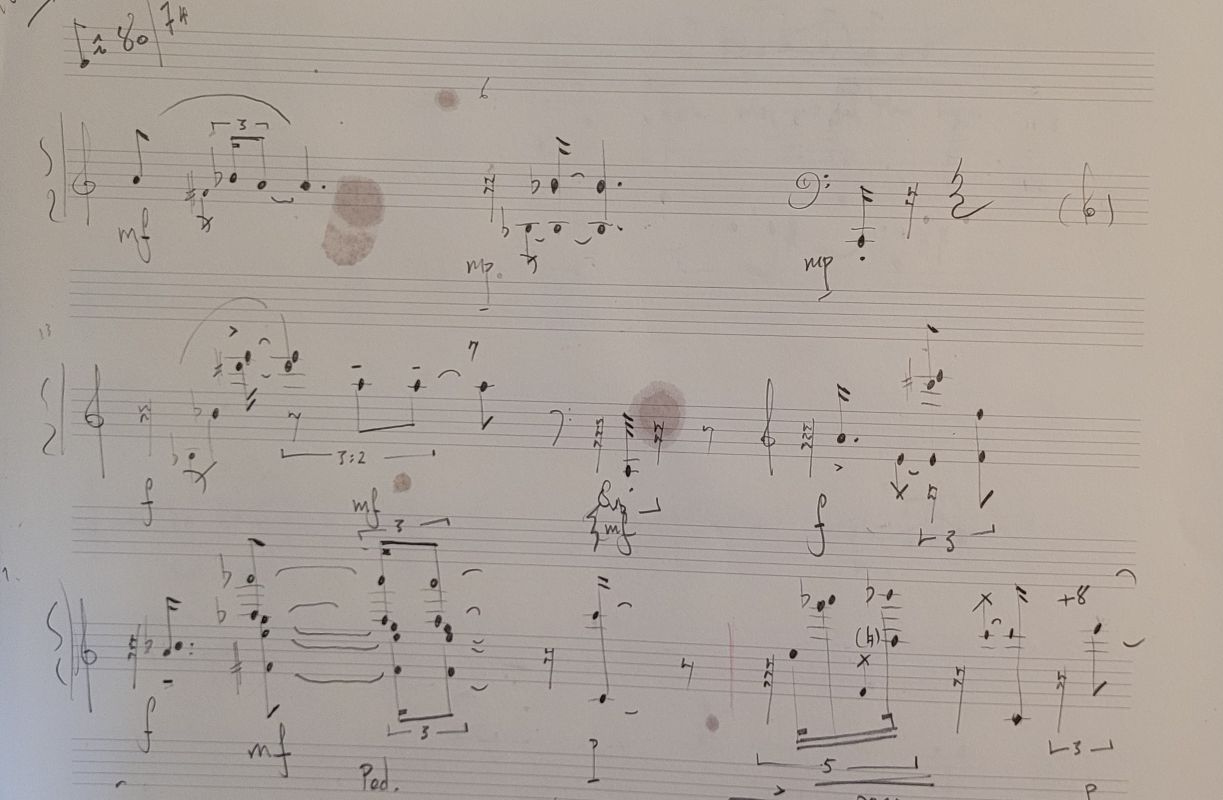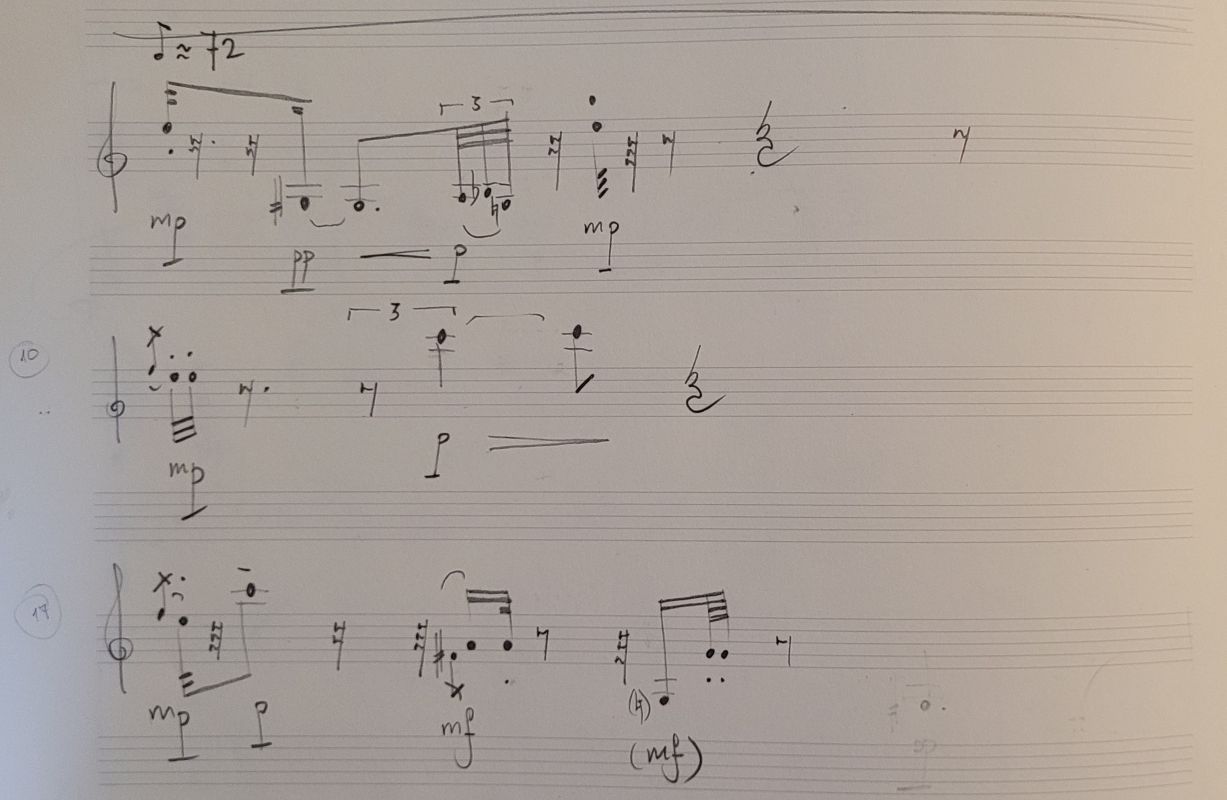Fake Recordings
Here are a collection of recordings of works.
Unless stated otherwise, these are audio realisations created by Finale.
The aim is to present some sort of record of works (I quite like) but which have not (yet) been performed and/or recorded.
These are shared with the understanding that these works were conceived to be performed by living musicians, who breath, articulate, stretch tempi, fight with the material and are beautifully imperfect.
Invention VII
For solo piano - completed December 2023

Fadensonnen
For percussion and clarinet - completed June 2023

Transit
6 short pieces for piano
For solo piano - completed June 2015

Episode IV
Leibeslied
For piano and orchestra - completed December 1997
As a work for large ensemble, the challenges of creating an adequate audio file are greater. So "pardon gentles all" this effort - which takes a ten-year-old finale file, and tries to present something approximating the work I originally envisioned.

Reviews
Along the way - some people have said some nice things about my composition - and some of these have been put in print or online...
...for which I am most thankful!
Invention (V)Still Life
Derek Jones (flute) and Jerry Wong (piano)Invention (V) for flute and piano
Flute Perspectives 3, Move Records
"it is always pleasing to come across a composer that I have not previously heard and Rohan Phillips’ Invention (V) is a true delight. Written only last year this is obviously a composer who does not bend with the winds of fashion but has a deeply thought out musical language and applies it with great creativity. The music evolves in what seems both an organic and highly structured way. I want to hear more music by Rohan Phillips in concert.
...I dipped into Volume 2 in the back catalogue and thoroughly enjoyed the brilliant performance by Jones and pianist Cameron Roberts ... I heard another work by Rohan Phillips, this time a work from 20 years earlier, Fragment III for flute and piano and again I found his music charmed.
Classicon / Alan Holley
"Rohan Phillips’ 2021 Invention (V) for flute and piano is an exploration of lightness with only one note in the piano lying beneath the range of the flute. Built out of Phillips’ COVID-19 lockdown project where he wrote a series of short solo pieces and inspired by the poem Still Life by Antigone Kefala, who is known for her restrained aesthetic and the sparseness of her work, this short piece is trance-inducing with the dialogic nature of the two parts. Though I would argue the work is one of the more abstract in the album, it begs for a second listening almost immediately. There is a beautiful edge to Jones’ playing in this piece, with laser-like sustained high notes contrasting against harmonic rich low notes, and he explores every second of the sparseness that the work offers—an unexpected favourite!"
Pan Magazine, British Flute Society.
Fragment III:in den/verflüssigten Namen/schellen die Tummler
arrangement for flute and piano
Derek Jones (flute) and Cameron Roberts (piano)
Flute Perspectives 2, Move Records
"Staying in the 21st century, Fragment III by Rohan Phillips is an arrangement for flute and piano of a flute solo originally in a larger work entitled Seven Fragments after Paul Celan for chamber ensemble and voices. The subtitle of the piece, translated from German – “in the liquified names the dolphins dart” – immediately creates an expressive, poetic ambience which is amply reflected in this small gem, leaving the listener wanting more."
Gwen Bennett Loud Mouth/The Music Trust, August 28, 2020
Meditations after «Der Krieg»
Arcko Symphonic Ensemble
Timothy Phillips, cond.
Church of All Nations, Carlton, November 11 2018
"While the initial sound scape tended to softness, it was soon punctuated with abrupt blurts that cut up the backdrop of over-arching single notes and overlapping timbre textures. For all that, the score reached passages of stridency that were confrontational through insistence, intended to support Dix’s pictures."
"(the) musical construct took on a life of its own and, while it was most informative to see Dix’s work as a sort of concomitant, the score stood up to scrutiny on its own terms."
O'Connell the Music
Lest we forget? Not a chance
November 15, 2018
Sarabande
Arcko Symphonic Ensemble
Joy Lee, Piano solo; Timothy Phillips, cond.
Northcote Town Hall, December 2014
"Rohan Phillips’ Sarabande has a lot of interesting parts, but hangs together rather loosely. This may be tied to the piece’s composition over a number of years and its inspiration from baroque dance suites with their fleeting characters. It is billed as a piece for piano and small ensemble, though the guitar part (Geoffrey Morris) has a role that at least equals the piano (Joy Lee). I particularly enjoyed the simplicity of the violin part at the beginning, with its single note acting as a pivot for the harmony around it. The cowbells are a playful feature, one of the many almost independent-sounding parts to the piece. I imagined myself lost in a sea of music, invited to listen to one part and then another. In a rare moment of inter-instrumental solidarity the French horn reaches out and continues the resonance of the timpani."
Matthew Lorenzon, Partial Durations
January 12, 2015
Brass Quintet
Argonaut Brass Ensemble (Ysolt Clark, Callum G'Froerer, Charles MacInnes, Ben Marks and Tristram Williams)
Rosalind Park, Bendigo. Sept.2013
"Yet two works stood out as truly exceptional among those by Australian composers: a beautifully crafted Brass Quintet (2013) by Rohan Phillips and David Chisholm's own Seven Little Miracles..."
'Bendigo International Festival Of Exploratory Music' [review essay]
Alistair Noble
The Wire (Issue 359, January 2014).
Symphony in three movements: 1991-1992
Canberra School of Music Symphony Orchestra
Max McBride, cond.
Llewellyn Hall, 16 June 1992
The premiere performance of the Symphony in Three Movements by young Canberra composer Rohan Philips opened a program of spirited playing and constant interest given by the Canberra School of Music Symphony Orchestra in Llewellyn Hall last night.
Scored for a large orchestra, this is a major composition which made a strong impression on this initial hearing, with the scoring highly assured and the musical interest generally strong. The slow first movement, titled Evocation Invocation, opens with melodic fragments appearing over a quietly sustained and static string back ground, these punctuated at intervals by forceful injections from the brass and percussion. As the move ment progresses, so the texture becomes more complex.
The second movement has a stronger rhythmic impulse, and is of a somewhat more aggressive expression. This mood is broken by contrasting moments of quiet introspection, thus reversing the sequences of the first movement.
These two movements held the attention with the strength and progress of their musical ideas, but in the final movement the range of its content did not seem to coalescc quite as successfully.
Nevertheless, this was a highly promising work which, in the working out of its musical material, suggested a promising future for the young composer. It was given a precise and well-controlled performance by the orchestra under the direction of Max McBride, the players responding to its not inconsiderable technical demands with commendable commitment.
"Strong impression left by premiere performance"
W.L.Hoffmann
Canberra Times Wed 17 June 1992, from Trove
But let's go to the experts

So... I discovered there is a much better way of evaluating music - it's called musicstax.com and they rate music by: Popularity, Energy, Danceability, Positiveness, Speechiness, Liveness, Acousticness, and Instrumentalness. It also provides a concise summary (see above).
Fragment III has a Danceability score of 41% (not too bad!) but it seems the poor old Invention (V) has just 5% Positiveness.